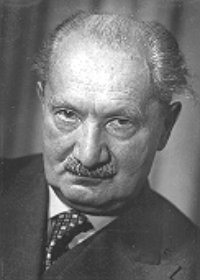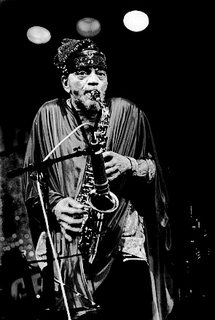Archives
- 01/01/2004 - 02/01/2004
- 02/01/2004 - 03/01/2004
- 03/01/2004 - 04/01/2004
- 04/01/2004 - 05/01/2004
- 05/01/2004 - 06/01/2004
- 06/01/2004 - 07/01/2004
- 07/01/2004 - 08/01/2004
- 08/01/2004 - 09/01/2004
- 09/01/2004 - 10/01/2004
- 10/01/2004 - 11/01/2004
- 11/01/2004 - 12/01/2004
- 12/01/2004 - 01/01/2005
- 01/01/2005 - 02/01/2005
- 02/01/2005 - 03/01/2005
- 03/01/2005 - 04/01/2005
- 04/01/2005 - 05/01/2005
- 05/01/2005 - 06/01/2005
- 06/01/2005 - 07/01/2005
- 07/01/2005 - 08/01/2005
- 08/01/2005 - 09/01/2005
- 09/01/2005 - 10/01/2005
- 10/01/2005 - 11/01/2005
- 11/01/2005 - 12/01/2005
- 12/01/2005 - 01/01/2006
- 01/01/2006 - 02/01/2006
- 02/01/2006 - 03/01/2006
- 03/01/2006 - 04/01/2006
- 04/01/2006 - 05/01/2006
- 05/01/2006 - 06/01/2006
- 06/01/2006 - 07/01/2006
- 07/01/2006 - 08/01/2006
- 08/01/2006 - 09/01/2006
- 09/01/2006 - 10/01/2006
- 10/01/2006 - 11/01/2006
- 11/01/2006 - 12/01/2006
- 12/01/2006 - 01/01/2007
- 01/01/2007 - 02/01/2007
- 02/01/2007 - 03/01/2007
- 03/01/2007 - 04/01/2007
- 04/01/2007 - 05/01/2007
- 05/01/2007 - 06/01/2007
- 06/01/2007 - 07/01/2007
- 07/01/2007 - 08/01/2007
- 08/01/2007 - 09/01/2007
- 09/01/2007 - 10/01/2007
- 10/01/2007 - 11/01/2007
- 11/01/2007 - 12/01/2007
- 12/01/2007 - 01/01/2008
- 01/01/2008 - 02/01/2008
- 02/01/2008 - 03/01/2008
- 03/01/2008 - 04/01/2008
- 04/01/2008 - 05/01/2008
- 05/01/2008 - 06/01/2008
- 06/01/2008 - 07/01/2008
- 07/01/2008 - 08/01/2008
- 08/01/2008 - 09/01/2008
- 09/01/2008 - 10/01/2008
- 11/01/2008 - 12/01/2008
- 01/01/2009 - 02/01/2009
- 04/01/2009 - 05/01/2009
- 07/01/2009 - 08/01/2009
- 09/01/2009 - 10/01/2009
- 10/01/2009 - 11/01/2009
- 11/01/2009 - 12/01/2009
- 12/01/2009 - 01/01/2010
- 03/01/2010 - 04/01/2010
Utopian Turtletop. Monsieur Croche's Bête Noire. Contact: turtletop [at] hotmail [dot] com
Tuesday, November 28, 2006
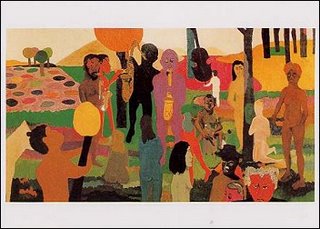 Music is truth. The yearning, the consolation, the jubilation, ecstasy. The body in space as articulated by the rhythms. The multiplicitous hubbub of competing, co-operative voices. The continuum of individual voices enhancing the communal voice by maximizing each voice's individuality within the parameters of the given piece. The emotional complexity and nuance thereof.
Music is truth. The yearning, the consolation, the jubilation, ecstasy. The body in space as articulated by the rhythms. The multiplicitous hubbub of competing, co-operative voices. The continuum of individual voices enhancing the communal voice by maximizing each voice's individuality within the parameters of the given piece. The emotional complexity and nuance thereof."Piece" of music: no mere random bit of language: Music is whole, we can hear it only in pieces.
Every society has music: for consolation and celebration, for ups and downs, hello and good-bye, grief and joy -- the nitty-gritty real deal of life. And: the universe vibrates, everything vibrates, everything got rhythm. Who could ask for anything more? Well, all of us could. And we do, we do. But that doesn't mean -- well, you know what that doesn't mean.
Words, yeah, words -- well, words, you know, words -- yeah, they can get part of truth, you know, or maybe more than part, I don't know. They're cool. I'm cool with words. But music . . . music . . . Mmmph!
(Image: The Garden of Music by Bob Thompson.)
Sunday, November 26, 2006
Lots of hot playing. I remember, years ago, when he had a regular column in the V. Voice, Simon Frith saying that Hawaiian slide guitar was the most influential guitar style of the 20th century, more than blues, being decisively influential on the guitar styles of country, southeast Asian pop, African pop, and, yes, blues.
Frith also said that the Neapolitan folk song, via Caruso’s records, was more influential, globally, in the 20th century, than jazz or blues. I wish I could find that column where he said it.
* * * * * * * * * * * *
Peli is having nightmares about turning 25.
In 1990, on a catch-as-catch-can road trip during the course of which I turned 27, my traveling pal Steve and I were in the Bay Area when we decided to hie on down to Santa Cruz to track down our college pal Johnny. We took a bus there without a phone number or address. Got off the bus, and who was there in the bus station, playing pinball, but Johnny’s quite-a-bit-younger brother Zay. I barely knew Zay, but he and Steve were friends, and it was a merry reunion.
“We came looking for Johnny.”
“He’s at work, working at a concert. He’s an usher. I’ll take you there.”
We got to the concert hall, and Zay cooked up a story. Their mom happened to be in town visiting then too -- or maybe she was there for a conference or to teach, I don’t remember. Zay told the outside usher to go inside and get his brother John, and that it was an emergency, because “something happened to our mom!”
Johnny came rushing out, worried worried worried, so worried he didn’t even see Steve and me standing next to his brother. Zay told him what was up, another merry reunion, plans to hook up at Johnny’s house after the concert, and Steve and I would hang with Zay till then.
Zay had a 2-foot rainbow spike mohawk and plans to meet some of his friends down by the levy to drink beer. Sounded good to us. We went down, hanging out, me feeling waaaay old-fashioned to be sporting a bald head, the punk fashion of 10 years previous which I had days before donned on a whim, for the 2nd or 3rd time in my life. Very pleasant to drink and chat with young punks, all in their early 20s, like Zay.
The party abruptly broke up when someone brought news of tragedy. A friend of theirs had taken his own life the night before, on the eve of his 25th birthday. “He didn’t want to get old,” people said. And people made plans to caravan to Los Angeles for the funeral, leaving that night.
Steve and I hooked up with Johnny later and drank long into the night with his housemates and assorted friends of Johnny’s, people I didn’t know, friendly people. The sorrow of the fear of aging made me feel old -- 27! -- but I’d always been old -- in fact I’m younger now than I was then (except for my weight, wrinkles, grey hair, and alcohol tolerance) -- and I pitied the poor young man who killed himself, and his friends who would miss him.
(Enjoy your youth, Peli. Don’t sweat it. Glad that 20’s feeling young.)
A couple of days later, I was back in Oakland, staying with my college pal and former theater-dance-and-music collaborator Leigh Evans (she danced and choreographed, I made music; we did theater together). While reading a book at the laundromat as my clothing spun, a 7 or 8-year-old girl who was there with her mom said to me, “I saw you in Santa Cruz. You were walking on the beach with your friend.” She had been there with her school group. Funny small town encounter. In Oakland. She was utterly nonchalant about it, neither amused nor surprised, just remarking as if it might be slightly less boring than saying nothing.
* * * * * * * *
More about the Four Freshmen and standards.
Forgot to mention in last night’s post that in the course of discussing the Four Freshmen’s style, my mom mentioned the difficulty of singing half-step harmonies. I’ve done it a little, on my own songs, singing 3-part harmonies in places where there are half-step intervals. It is hard.
And about standards: It occurred to me that it might be interesting to try to sum up the requirements of a pre-rock, non-rural standard popular song:
1) Catchy melody. All of the standards are instantly hum-able.
2) Speech-like prose syntax stretched over a rhyme scheme, with proper grammar and good English sentences.
3) Strong sense of aesthetic decorum, with elaborate rhyme schemes being reserved for high spirited and/or comedic numbers, usually, and plainer rhyme schemes for emotionally heavier songs.
4) Rhetorical-emotional twinning of words and music.
5) A memorable catch-phrase repeated in the song, almost always the song’s title. Alan Lerner, in his memoir The Street Where I Lived, says that when he and composer Fritz Lowe were writing a song, they always decided on the title first. Lowe would write a melody that would convey the song’s emotion, and the melody would include a place for the title, around which Lerner would then write the rest of the song’s words. In a radio interview included as a bonus track to the My Fair Lady original Broadway soundtrack, Lerner and Lowe play an unfinished alternate take of the Camelot song, “If Ever I Would Leave You,” where the title phrase comes at the end of a larger phrase, rather than at the beginning, which is where it goes in the finished version.
I’m sure there are exceptions -- if you think of one, please drop it in comments! -- and I may have missed a rule -- and if so, please let me know -- but this is how I hear them.
* * * * * * * * * *
While my family was here I didn’t miss my dad -- they had all visited here more than he had, and the hubbub was full and plenty -- but today I did as we went to Seattle Center to go ice skating. My dad loved ice skating and hockey; I wanted to call him and tell him we were going.
After ice skating we went into the Center House, which includes a Food Court with a stage, where community ethnic heritage groups were playing music and dancing. The Finns were finishing up as we got there -- nice mellow accordian-violin waltzes. We caught the whole set of the Hawaiians, a very nicely pleasant and relaxed singer backed by her own ukulele and four guitars -- lap-slide, acoustic rhythm, electric bass, and an 8-string tenor-looking thing that wasn’t a mandolin -- more nice mellow music. Then the Croatians took the stage with a hopping acoustic band led by a tiny, loud, banjo-looking thing -- they were the hottest of the three bands, with the most lively dancing, but we had to leave. You never know what you’ll come across at Seattle Center. The kid dug it; my beloved spouse and I did too. Live! Amateur! But well-rehearsed! And lively! Music!
Saturday, November 25, 2006
*
My son started crying when my mom, my brother, my sister and her family all left today, and so I cried too. The house was full! Hanging out, talking, great feasting, and happy kids.
Listened to the Four Freshmen with my mom and learned that she and I had played the same venue, 25 years apart. Her sorority vocal quartet sang Four-Freshmen style arrangements of standards like the Gershwins’ “Love Is Here to Stay” at the Michigan Union (an Ann Arbor student hall) in the late ‘50s; in the early ‘80s my punk-post-punk band played our originals there too. Mom sang alto; I played second guitar and number 3 riff-meister, behind the bass player and the first guitarist (my friend Jake). My mom’s sorority sister and lifelong friend DL wrote the arrangements for their quartet; I just sent a card to DL a couple of months ago. As one song was coming on the Four Freshmen CD I said, “This is a good one,” and Mom said dismissively, “Oh, they’re all good ones” -- a telling comment from the age of “standards” -- all of the songs had been thoroughly, ultra, mega-vetted by the time a group like the Four Freshmen recorded one of them. They did write at least one original (I have it), and they wouldn’t have recorded it if it hadn’t been as good as the standards.
While going through my parents’ belongings recently my sister found a 45-rpm-size recorded memento of the the 1956-’57 academic year at the University of Michigan, and she brought it to give to me. The university’s president narrated highlights of the year. One of the year’s highlights: a recording of the Ellington band playing a snippet of the Billy Strayhorn standard “Take the ‘A’ Train” played as the narration told of the Ellington band coming to play a dance. Mom said, “I went to that dance with somebody! I remember dancing.” Years before she had told me that she had danced to the Ellington band, saying slightly ruefully, then, “We should have been listening!”
Wednesday night my brother and I hooked up with a childhood friend of ours who lives in a suburb here, and I talked them into going to an open mic where I could try out a theory. I used to play this open mic fairly regularly, 10, 12 years ago, but stopped years ago when the bar started hiring me to play for pay there with the aforementioned Jake, which we stopped doing years ago. Earlier this year I started going again every once in a while -- to listen -- but one time I went up to play and found it deeply dissatisfying. One song, shouting into the din, just another guy with a guitar, with neither a glorious voice, nor, on the song I chose, an undeniably exciting beat, the two possible paths to climbing over the din of indifference. I decided then and there -- and this was months ago -- that the next time I tried it I would sing a cappella, hoping the naked (amplified) voice would distinguish me and conquer listener apathy. Wednesday night I tried it, only with harmonica, and played two songs from the deep catalogue, a William Blake poem I set to bluesy-rootsy music about 20 years ago, and a bawdy blues number I wrote in 1990 or ‘91. And my theory was right. They went over great. The harmonica grabbed the ear, and songs held their own. And dirty jokes always go over well. (I stole a dirty image from a Shakespeare poem -- “I love to nibble your grassy hills.” Blues & Shakespeare blend seamlessly.) People got into it, even clapping along at one point, a loud crowd beat. Made me think, dang, I should write some new stuff for voice & harmonica. The blues number I sang has a nice guitar riff too, but, in this venue, the guitar would only have hurt it. The Blake poem I’ve sung in bluegrass arrangement, a cappella with several percussionists, with harmony or solo -- it’s versatile.
On Thanksgiving Day I fell somewhat under the weather, stomach pains and flu symptoms but no vomiting or fever. I ate far less than usual at the Big Eat, and even left the party for a while to take a nap. But the party at our neighbors’ place was lovely; the hosts were warm and welcoming to my family, and everybody had a great time. My spouse cooked the turkeys (with some help from me, and stuffing by my mom, with help from me), my mom cooked squash, my brother-in-law made the gravy, I made a vegan dessert (so my milk-allergic son could have something), and the hosts and other guests cooked a storm of glorious side dishes and desserts, all of which I tried -- a little -- and it was wondrous. Friday my son got my bug, only this time with vomiting, and I slept most of Friday, missing the day’s family outings, which disappointed me, and today we’re both mostly fine. Grateful for the visit, sad that it’s over.
Back at it, whatever “it” may be . . .
As the playground saying goes, one-two-three -- you’re it!
Monday, November 20, 2006
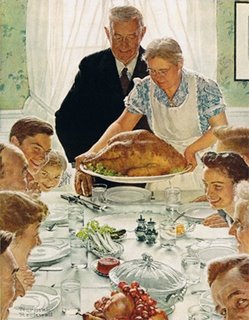 Freedom from want -- something to be thankful for. Which reminds me, something I've been thinking about --
Freedom from want -- something to be thankful for. Which reminds me, something I've been thinking about --every prayer of Thanksgiving, no matter how humble, is also a song of triumph -- I HAVE SOMETHING TO BE THANKFUL FOR.
And I do.
In the aftermath of my dad's death, my sister wisely decided to uproot the old traditions and detour the family from the routines. I hadn't been home for Thanksgiving in 15 or 16 years or more, but everybody else is Back There, where the old routines live. And so -- my sister booked everybody's tickets and they're all Coming Here -- tomorrow! My sister & her 2 kids (one older, one younger than mine), my brother, our mom, and then, on Wednesday, my brother-in-law. Staying here.
My nucleus's routine has been to Give Thanks at the neighbors' house across the alley. Last year for the first time we cooked the turkey and we signed up to do it in perpetuity. Our neighbors love a big holiday party; it's usually around 20 people, and this year coincidentally a bunch of the regulars aren't coming, and so there's plenty of room for my 6 relatives, which there would have been anyway, somehow.
No blogging till after. Have a good one. Cheers -- and thanks --
Sunday, November 19, 2006
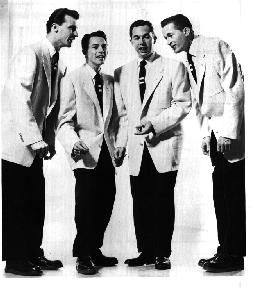
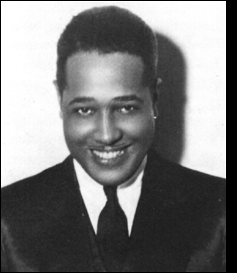

Recent hits.
*
Duke Ellington’s reading of Gershwin’s “Summertime” from his 1961 trio album Piano in the Foreground with regular bassist & drummer Aaron Bell & Sam Woodyard. As wild as anything on his much more celebrated trio summit with Charles Mingus and Max Roach from a year later, Money Jungle. Beyond-Thelonious dissonances with nonpareil polyrhythmic rubato from the rhythm section. And still Gershwin’s gorgeous lullaby melody (which he partly borrowed from “St. Louis Blues”) shines through. Almost scary in its grim power and acidic beauty.
*
A superbly hushed, awed, tinged-with-melancholy reading by the Four Freshmen of a song by Jimmy Van Heusen and Johnny Burke, It Could Happen to You. The song’s “It” has no antecedent, calling to mind Freud’s “It” and Lauryn Hill’s “That Thing,” only “It,” here is looooove, including sex. “All I did was wonder how your arms would be / And it happened to me.” Sung with their trademark melancholy-luscious close harmonies.
*
“Amante io vo se dire” by Benedetto Ferrari, the opening track on Anne Sofie von Otter’s superlative collection of baroque melodies, Music for a While. She sings it zestily with a pop singer’s sense of portamento, and her band digs into the rhythm with gusto.
* * *
I have long wondered why classical singers seem to such a restricted sense of timbre compared to pop singers. Recently it occurred to me that classical singers need to project to the back of large theaters without amplification, and this necessity might limit their possibilities with timbre. Pop singers for 80 years have tailored their art to the microphone. Classical hasn’t caught up.
I’m not saying that every classical singer should sing like a pop singer, but there’s no reason for some of them not to try. If Lotte Lenya had sung Schubert Lieder, wouldn’t a lot of them have sounded like Kurt Weill songs? “Meine Ruh’ ist hin, mein Herz ist schwer.” My rest is gone, my heart is heavy.
Saturday, November 18, 2006
When Bach was 20, he walked over 300 miles to hear Buxtehude play the organ.
That's some serious devotion to music.
Thursday, November 16, 2006
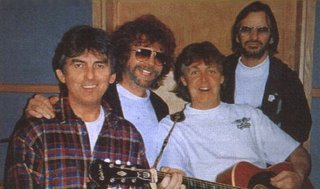 The Beatling Wilburys with the last fifth Beatle, Jeff Lynne of ELO
The Beatling Wilburys with the last fifth Beatle, Jeff Lynne of ELOI horde music. My collection pales in comparison to many, but I wouldn’t trade it for anybody’s -- because I have the Best Taste in the World. (Don’t you too?) Nobody else’s collection would suit my listening desires as well.
Hording is about repetition anxiety. I want to have repeated listening experiences on demand. If I don’t possess a desired recording, I cannot listen to it over and over. And over and over. And over.
I’ve been listening to the Traveling Wilburys lately, especially “Vol. 3,” which didn’t have the hits, and didn’t have better songs, but it has surprising qualities: more enthusiasm and more abandon as well as more plushness. It’s a surprising combination -- enthusiasm and abandon and plushness. The hopped-up rock rhythms convey the enthusiasm and sometimes even abandon; the knee-deep-shag guitar mix is super-deluxe plush.
“Vol. 3” ’s opening track, “She’s My Baby” -- how enthusiastically silly, sending up rock cliches with such glee and real musical vim, and with deft deployment of voices. Like a jazz combo arranging to show off different lead instruments at different times, the Wilburys trade the lead from voice to voice. “She’s My Baby” proceeds up the ladder of intensity and distinctiveness, starting with the lovely and smooth singer Jeff Lynne, onto the idiosyncratic and laid-back Tom Petty, then to the incomparable Bob Dylan, and then, surprisingly, topping Dylan’s virtuoso croak with George Harrison’s emotion-laden warmth and wit. If you listen to the early Beatles records, George’s lead singing does not portend that by the late ‘80s he would become a commanding vocal presence, but he did. “She’s got a body for business and a mind for sin” -- it helps that he has a witty line. Dylan takes the song back at the end for the last verse, though, to no shame for George; and who but Dylan could sing with such a hilarious croak, the song’s last line before the out-chorus, “She likes to stick her tongue right down my throooooat,” sounding like death itself as he holds that long Oh, before the group vocal comes back to close it, “She’s Myyyyy Bay-buh.” Masterfully joyous, witty, noisy rock and roll.
The posthumous Beatles single “Free As a Bird” repeats the same trick even more astonishingly. A sweet melancholy unfinished Lennon demo, fleshed out into a full record by the surviving Beatles (produced by Jeff Lynne, unexpectedly turning this Beatles record into a Wilburys-offshoot group, the Beatling Wilburys). The other day I listened to it over and over. Astonished at how Harrison grabbed the song’s climax.
After Lennon’s sweet slightly melancholic verse, Paul added a sweet, slight, love-song bridge --
Whatever happened to
The life that we once knew
Can we really live without each other
Where did we lose the touch
That seemed to mean so much
It always made me feel so free --
neatly and Beatle-esquely tying back into the verse, the first word of which is “free.”
Second bridge, George truncated Paul’s stuff, singing with more intensity, and suddenly it’s not a sweet, slight love song, it’s a heartfelt intense love song of grief to his dead friend the missing Beatle John.
Whatever happened to
The life that we once knew
Always made me feel so free
And then his guitar solo stabs me right in the heart, as the weeping guitar is held aloft by the angelic choir of background Beatle-singing “Ahhhs.”
I listened to the song three times in a row and then twice in a row a few days later, and it was only in the fifth listen that I didn’t burst into tears at the guitar solo. And it felt very good to burst into tears, I enjoyed it very much, it was soothing and cathartic. I was glad to have this hoarded music to play over and over to grab the tears out of my body. I don’t quite understand it and I doubt I ever will and that’s OK.
But what I want to know is this: what fan of “Do You Want to Know a Secret” would have predicted that by 30 years later George would be the most commanding singer of the group and given the climax of a song? And he really had a deep emotional range as a singer by the end, joy and grief and goofiness and melancholy. Which is to say -- life.
Wednesday, November 15, 2006
It’s always amusing to see a professor at one of the leading nuclear-weapons-research institutions in the world, the University of California, comparing his act of not voting to being a member of the French Resistance. (It’s true that he leaves himself an out by mentioning that, after all, he has to pay his rent like any washer of dishes or digger of ditches.) A keen historian such as himself should not be surprised when Heidegger comes immediately to mind, though the comparison is not entirely fair, because Heidegger explicitly praised Hitler*, while the closest our historian has come (and it’s not very) is to raise a cheer for Ezra Pound on the grounds that he was anti-bourgeois, almost as if to say -- better a fascist anti-Semite, like Pound, than a bourgeois. (And by the way, it’s Shapiro, not Schapiro, and his out-of-print book-length sequence The Bourgeois Poet is witty and alive.)
It’s wacky to follow the dialogue over a cliff, according to Godwin’s law, but the really funny part is where our interlocutor says, really, he means no offense in comparing his friends to Vichy-ite collaborators because they vote. (And apparently, per the comments to this post, they really are friends.) “Now now, old boy, please do not be insulted when I say to thee that thou art indeed a miserable cur and a scoundrel; I really do like you, old boy, despite your scurrility.”
But it’s interesting to take our dear professor at his word when he tells us that the insult here is incidental; it leaves the analogy pointing at self-aggrandizement. Join the Resistance! It’s easy! Don’t vote!
Joking aside, this nonsense is objectionable precisely because Joshua/Jane is preaching acquiescence in the form of resistance. Here is the relevant passage -- the Third Choice is Resistance, following the First Two Choices, Nazi or Vichy:
History teaches as well that it requires no ideological purity, nor claim of same, to make the third (or any other) choice; that such choices are humanly (if not ideologically) open to everyone; and that such choices might be seen as supremely pragmatic. They require no test of purity at all, but the merely posing of the question, What would refusal look like, what would negation look like in this intolerable situation?According to this, there is no need either to act on the answer or even to answer the question at all. Merely to pose it is to join the Resistance. Without a vision of alternative action or alternative society, which he does not begin to provide, what Joshua calls resistance is really acquiescence and quietism, nothing but a self-congratulatory song of surrender.
*Heidegger really was a Nazi. He is in the picture with an X below him.

And this is from a speech he gave as a professor at a Nazi-associated university.
German Students! The National Socialist revolution brings complete upheaval to our German life. . . . Do not let dogmas and “ideas” be the rules of your being. The Führer himself and alone is the German reality, present and future, and its law. Learn always to know more deeply: from now on every matter requires decision and every action responsibility. Heil Hitler!* * *
P.S. I do not condemn Joshua for his job -- I went to college, some of my old pals are professors now, one of my best friends works for UCLA -- I simply could not resist the vision of Heidegger as freedom fighter. The self-aggrandizement in Joshua's post really trivializes the risk and sacrifice that members of the Resistance faced. Maybe Joshua faces similar risks in his non-blogging and non-professional life, but all he gives us to go on is what he writes.
Tuesday, November 14, 2006
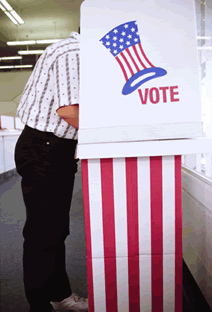
 Voting and shopping: 2 different things. To vote 3rd party is to confuse voting with luxury consumerism. It is an expression of snobbery, the refusal to sully oneself by associating with something "not good enough" for one.
Voting and shopping: 2 different things. To vote 3rd party is to confuse voting with luxury consumerism. It is an expression of snobbery, the refusal to sully oneself by associating with something "not good enough" for one.*
Refusing to vote on the grounds that to vote is to grant the legitimacy of the social order reveals one's narcissism. The social order exists regardless of your opinion of its legitimacy. The question is, what are you going to do about it?
*
Voting is one political act among many. Despising it for not being a cure-all is a mere expression of a sheltered life of privilege.
*
Refusing to vote because of a judgment that no difference exists between the two major parties reflects a plain and simple ignorance. To name three differences: abortion rights, contraception, and the invasion of Iraq. No Democratic president would have invaded Iraq in 2003, no Democratic president would have appointed anti-choice judges to the Supreme Court, and no Democratic president would have cut funding for contraception to 3rd World health clinics.
*
I'm enthusiastic about the Democrats' takeover of Congress, despite their being a moderate-to-conservative party by European standards, because by European standards, the Republicans are an extremist reactionary national-front party.
 If this were a tourist postcard, I would buy it; sardonic irony is popular, and I am of my moment.
If this were a tourist postcard, I would buy it; sardonic irony is popular, and I am of my moment. (I really like the camcorder.)
(And thanks for the picture.)
* * *
The day after taking the kid to hear the Boeing Employees’ Concert Band play patriotic music on Veterans’ Day, I took the kid to hear my friends in La Banda Gozona play a fundraiser for the Oaxacan teachers’ union, which sparked a general uprising there. A hot brass band (2 in 2 days!) and a lovely time, seeing old friends, eating Oaxacan food, digging the music and taking part in the festive atmosphere, people dancing. The crowd (and the band) a mix of gringos and Mexicans. The band played what I thought was a Hanns Eisler song but appears to have been a song by the Chilean composer Sergio Ortega; a group of Mexican men started singing/chanting, to the music, El pueblo unido jamas sera vencido!
My friends -- and the crowd -- rocked it: a lot more lively & joyous than the Veterans’ Day concert. Fleeting notions of resistance as festival and festival as resistance; ends as means; political vision embodied in political action; not political parties -- politically partying.
Sunday, November 12, 2006
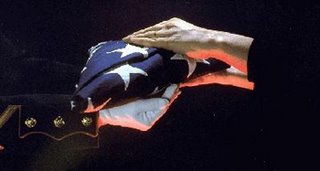 VETERANS’ DAY
VETERANS’ DAYIt surprised me at my dad’s funeral when, at the graveside, my cousin, who was the funeral director, got on one knee and said to my mom, “The president of the United States thanks you for Mike’s service, on the behalf of a grateful nation,” and gave her a flag that two sailors had ceremoniously folded. My dad had enlisted in the Navy in 1961, after having gotten married and graduated from college. He was proud of being a vet. He served in Vietnam on a supply ship, overseas for 7 months, saw no fighting, and got out in ‘67.
When my cousin invoked our president, he was invoking the office and not the person. This cousin served in the Navy too, was in Lebanon in ‘83, and recently retired after 20 years in the Reserves. The ceremoniousness of the flag-passing was odd and touching and real. My dad was a Republican who volunteered to serve under Democratic presidents.
Dad was a moderate Republican, pro-choice and anti-racist, and when the Republican Party left him he didn’t realize it and stayed loyal. Every other year or so for the last 10 or 12 we would get into a horrible argument about politics.
For the last few years on Veterans’ Day he would ask me what I was doing that day to honor veterans. I always held my tongue and did not say, “I’m supporting Democratic politicians,” even though it would have been an honest answer -- the D’s have consistently for many years been better on Veterans’ issues than the R’s.
This year it looked like rain, my beloved spouse had a cold, and the community gyms where kids could play were closed, so I looked in the paper for somewhere to take the kid. The Boeing Employees Concert Band was playing a concert of patriotic music at the Museum of Flight. The kid & I dig brass bands, so we went.
They nailed the Sousa and struggled with Gershwin’s “An American in Paris,” but it was still great to hear it live; likewise two movements from “Suite Francaise” by Darius Milhaud. But the medley of service hymns tore me up. They asked the veterans if each branch of the service to stand when their hymn was played. Vets from all four branches of the service played in the band, so they led the way for the standing, and as these mostly elderly men, all in blue jeans and flannel shirts, stood up, everybody applauded. I missed my dad.
A couple of months after he died I learned that the VA medical services he availed himself of were only offered to veterans with service-related injuries and to low-income veterans. My dad was the latter. I grew up middle class, but after I was grown my parents were consistently under-employed. They managed to hold onto their inherited property, but Dad qualified for VA medical assistance.
I recently read that the American Legion has been asking Congress to make VA medical service available to all veterans regardless of income or injury status. The Legion wants it because the smorgasbord of managed care options is an expensive, irritating, bewildering labyrinth for most people. People who have crunched the numbers admit that the VA delivers higher quality health care for less money than any other system in the country public or private. But the government won’t expand it even though we would save money. Something about an anti-government ideology getting in the way.
Single-payer universal health care. It’s cheaper and better. Here’s hoping.
Before it was Veterans’ Day, November 11 was Armistice Day. Peace.
Saturday, November 11, 2006

"The man with the stick, when he waves the stick, that means Go, and when he stops waving the stick, that means Stop. Sometimes concerts are like that."
(The coming-on-4-year-old said this.)
(Picture stolen from Sequenza21.)
Thursday, November 09, 2006
* * *
(Updated with next morning's 2nd thoughts, below.)
* * *
It’s fashionable in the artsy neighborhoods of liberal-ville and even moreso in the furthur suburbs of left-topia to pooh-pooh the significance of Tuesday’s election results, or, at best, to temper one’s immediate reaction of enthusiasm with foot-shuffling admissions that of course one doesn’t believe the Democrats’ hype that they’re actually any much good after all.
Pish posh.
True, with few exceptions, most Democrats would indeed pass as members of the local Conservative Party in any normally functioning industrialized democracy; true, many-to-most of them are in the pocket of various big business interests (but remember: “big business” is not a monolith, and some factions are more depredatory than others); true, too many of them supported Bush’s depraved, insane, evil war (and no, it simply will not do for any Democrat to say, doe-eyes welling with tears and lower lip a-trembling, “But, but, but, George Bush LIED to me!”; what transparent poppycock, what political cowardice, what moral ghastliness); and too few of them stood up to his neo-feudalist-hierocratic-medievalist-lying-freak court appointments.
All of this is true, and suburban left-topians won’t be mollified by my pointing out that in contrast with the culpability of a significant percentage of the Democrats, 99% of the Repubs voted lockstep with Bush more than 90% of the time (in other words, that 99% wicked is materially worse than 50% wicked), and that no Democratic Commander in Chief would have invaded Iraq in 2003 -- such distinctions are contemptible in left-topia. Fine; part of me admires the refusal to stay, as Bush’s people so surreally dismissed it, “reality based.”
Here’s the thing. (No, not That Thing!) (Or is It?)
It was clear in 2002, probably 2001, that Bush was going to invade Iraq, and no amount of Democratic resistance was going to stop him. General national strike would not have stopped him. Despite that, it was important to hit the streets, stand up and be counted, and show our faces in opposition.
Why?
To show the world that not all Americans are clueless and/or evil and/or insane, that a whole lot of millions of us oppose this mad wickedness.
I hope, but am by no means sure, that by depriving Bush of his lockstep majorities in Congress, we the voters have slowed down his wicked insane plans, and perhaps prevented the Next War. Like I said, I am by no means sure, but even if my hope is misplaced, we still have, in the eyes of the rest of the world, taken a significant public step away from the mad wickedness that has defined our foreign policies.
At least for now -- and I’ll take it with a hugely relieved sigh.
* * *
If you’re wondering why a picture of the great alto saxophonist Marshall Allen adorns this post, I commend to you Carl’s tasty pictures and interesting thoughts on musical connections to the election (the comments of which include my embarrassing gaffe about Mr. Allen’s name; hence, this tributary picture and apologetic parenthesis -- my sincere apologies, Mr. Allen).
* * *
Several songs underway for National Solo Album Month; even before the electoral relief came, I was psyched to be delving into the massy block of possibilities that constitute our language in search of lyrical outcroppings; and -- I’m delighted to see my virtual buddy Gary Oxford, better known in Blogville as Corndog, on the list.
* * *
Cheers.
* * *
Next morning's 2nd thoughts: funny that I've gone done the thing I've dissed: I qualified my enthusiasm for the election results by distancing myself from the Democrats.
What I'm psyched about the elections:
Democratic chairs of the investigatory committees in Congress. No more free ride for the criminals in the White House.
No more free ride for Bush's judicial nominees. This is huge.
A lot of the Democrats are actual liberals. My rep, "Baghdad" Jim McDermott, is an MD who supports single-payer universal health care. He may chair a subcommittee on health issues. I'm not very optimistic on this one, but any progress here is good. More Dems than is commonly known support single-payer.
Undoing the Medicare drug benefit debacle.
No Social Security destruction.
Possibility of war de-escalation.
And, in general, a rejection of the Republicans' anti-gay, anti-woman, anti-minority rhetoric and policies. This is huge.
Funniest comment on Seattle's liberal rep I've recently read: Somewhere -- now I don't remember where, probably one of the dailies -- an article on the Democratic incumbents' strengthening positions from the Washington delegation. A Republican privately repeats some "outrageous'' thing McDermott has publicly said, gloating to one of Washington's less liberal Democratic Congressmen about how McDermott's "extremism" (example: "George Bush is lying us into this war," said about the Iraq invasion before it happened) will reflect badly on the Dems. The Democratic Congressman responds (paraphrase), "You have to understand, when he said that McDermott just made his vote total in the next election go from 77% to 79%."
Tuesday, November 07, 2006

Please vote today. Thank you.
(Photo Credits: Chaps by my beloved spouse. Jack-o-Lantern face drawn by Fingers Hilarity and carved by the blogger. Bolo tie bought by my late beloved University of Utah social work professor great-aunt as a gift for her brother my late beloved grandpa. Belt buckle given to Fingers for the costume from an ex-biker friend. Photo by my beloved spouse.)
Sunday, November 05, 2006
HAUNTOLOGY
(and my first venture into MP3 blogging)
Various music bloggers have been discussing Hauntology (including Simon in his recent posts on nostalgia for the future). Everybody seems reluctant to define it, or maybe I’m simply reluctant to apprehend the definition, but it seems to encompass sampling and spookiness. For years I have thought of recording itself as a ghostly, disembody-ing process -- even more than writing. And writing itself can be ghostly -- if you have ever come across writing by somebody whom you loved and who has died, you will know what I mean. After our dad died my sister found Valentine’s Day poems he wrote to our mom, but spoken in my voice, their then-two-year-old and three-year-old son. Really sweet little rhymes. Years before that, one summer my dad had found letters his mom had written to him when he was 10 and away at camp. The written word carried her spirit across time and beyond the grave, as did my dad’s rhymes -- ghostly.
Years and years ago I wrote a song about a break up, which mentioned falling asleep with the ex while listening to Louis Armstrong records. It had the line, “dead people singing in our sleep.”
And coincidental to all this, in 1989 I made a soundtrack to an experimental film by my good friend Ross Lipman. (I found out today he recently showed the film in Vienna, at a showing he had there.) I recorded myself singing Duke Ellington’s song “In My Solitude,” and mixed in recordings of the same song by Louis Armstrong and His All-Stars (guest pianist, Duke Ellington, and Trummy Young on trombone) and by Thelonious Monk (solo piano), as well as recordings of two pieces by Debussy, the orchestral tone poem “La Mer” and his brief solo piano piece “La plus que lente.” I spun the music backwards and forward, put the orchestra through a fuzz box, sped up the Debussy piano solo and put it through a “chorus” unit, and had a fine time. I had come to collage from John Cage & Robert Rauschenberg (and Picasso) and had experimented with it in live performance before this recording; later, De La Soul blew me away, as did John Oswald.
The song’s lyrics seem relevant to hauntology:
And now, from a tasty MP3 post by Franklin Bruno (and welcome back to Blogville, Franklin!), I have learned of a service called BlogAmp, which is allowing me to post my low-fi, hauntological collages from 1989, made when I was 25.
Here they are.
Solitude Montage 2 (me, Pops & Claude)
Solitude Montage 3 (me, Pops & Claude take it to the bridge)
Solitude Montage 4 (Monk, Pops/spoP, Claude)
Solitude Montage 5 (me & Claude)
Solitude Montage 6 (Monk, Duke & Trummy)
Solitude Montage 1 (LaMer/reMaL)
(and my first venture into MP3 blogging)
Various music bloggers have been discussing Hauntology (including Simon in his recent posts on nostalgia for the future). Everybody seems reluctant to define it, or maybe I’m simply reluctant to apprehend the definition, but it seems to encompass sampling and spookiness. For years I have thought of recording itself as a ghostly, disembody-ing process -- even more than writing. And writing itself can be ghostly -- if you have ever come across writing by somebody whom you loved and who has died, you will know what I mean. After our dad died my sister found Valentine’s Day poems he wrote to our mom, but spoken in my voice, their then-two-year-old and three-year-old son. Really sweet little rhymes. Years before that, one summer my dad had found letters his mom had written to him when he was 10 and away at camp. The written word carried her spirit across time and beyond the grave, as did my dad’s rhymes -- ghostly.
Years and years ago I wrote a song about a break up, which mentioned falling asleep with the ex while listening to Louis Armstrong records. It had the line, “dead people singing in our sleep.”
And coincidental to all this, in 1989 I made a soundtrack to an experimental film by my good friend Ross Lipman. (I found out today he recently showed the film in Vienna, at a showing he had there.) I recorded myself singing Duke Ellington’s song “In My Solitude,” and mixed in recordings of the same song by Louis Armstrong and His All-Stars (guest pianist, Duke Ellington, and Trummy Young on trombone) and by Thelonious Monk (solo piano), as well as recordings of two pieces by Debussy, the orchestral tone poem “La Mer” and his brief solo piano piece “La plus que lente.” I spun the music backwards and forward, put the orchestra through a fuzz box, sped up the Debussy piano solo and put it through a “chorus” unit, and had a fine time. I had come to collage from John Cage & Robert Rauschenberg (and Picasso) and had experimented with it in live performance before this recording; later, De La Soul blew me away, as did John Oswald.
The song’s lyrics seem relevant to hauntology:
In my solitude
You haunt me
With reveries
Of days gone by
In my solitude
You taunt me
With memories
That never die
And now, from a tasty MP3 post by Franklin Bruno (and welcome back to Blogville, Franklin!), I have learned of a service called BlogAmp, which is allowing me to post my low-fi, hauntological collages from 1989, made when I was 25.
Here they are.
Solitude Montage 2 (me, Pops & Claude)
Solitude Montage 3 (me, Pops & Claude take it to the bridge)
Solitude Montage 4 (Monk, Pops/spoP, Claude)
Solitude Montage 5 (me & Claude)
Solitude Montage 6 (Monk, Duke & Trummy)
Solitude Montage 1 (LaMer/reMaL)
Saturday, November 04, 2006

In the comments to Thursday night’s post on Nostalgia for the Future, Dylan scholar John Hinchey mentions Dylan’s song “Highlands” from about 10 years ago as an example of Dylan being nostalgic for an unobtainable future. That song always struck me as being about death; Dylan’s Highlands are so much less physical, so spiritualized, so vague, compared to the physical Highlands of Robert Burns’s poem, “My Heart’s in the Highlands”.
I am glad that John H. mentioned Dylan’s song, because the the idea of Dylan being nostalgic for death reminded me that the Mexican modernist poet Xavier Villaurrutia wrote a book called Nostalgia for Death in 1938. Here is a poem from the book, “Volver . . . ,” or, “To Go Back . . . ,” in Eliot Weinberger’s translation:
To go back to the distant country,
to go back to the forgotten country,
secretly deformed
by exile in this land.
To leave the air that encases me!
To anchor once again in nothing.
Night is my mother and my sister,
nothing is my distant country,
the nothing full of silence,
the nothing full of emptiness,
the nothing with no time, no cold,
the nothing where nothing happens.
This persuades me of nostalgia for the future -- this persuades me that the speaker remembers non-existence, and has nostalgia for it, and faith that he will return to that state.
Thursday, November 02, 2006
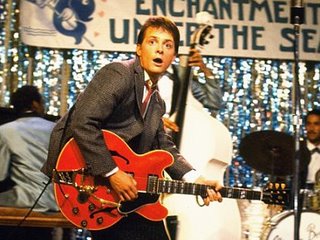
Back to Nostalgia for the Future
After I posted this morning, mostly rejecting the notion of “nostalgia for the future,” I remembered something Eliot Weinberger wrote: that the post-War generation was the first to have grown up without the assurance of a future for the species, and that every subsequent generation has never known life without the shadow of extinction. The prospect of nuclear catastrophe makes any future questionable.
Maybe that’s what the future-nostalgists are talking about. A nostalgia for a past in which our species was guaranteed a future.
There is something to that, but I don’t think that is what they are talking about. I have no doubt that Michael J. Fox is nostalgic for a culture which believed in a future of scientific progress. And maybe his hope for a cure constitutes a nostalgia for the future.
* * *
All-time worst fake-nostalgic moment in the movies: In Field of Dreams, with the fictional cantankerous black Civil Rights writer played by James Earl Jones waxing nostalgic for pre-Jackie Robinson pro ball. In the book (Shoeless Joe), the cantankerous nostalgic writer is named J. D. Salinger. Much more interesting -- with the benefit of not being insulting to our sense of decency.
Though a suburban white kid teaching Chuck Berry his licks has to rank down there too.
You want Chuck’s guitar source, check out Sister Rosetta Tharpe.
(No relation, as far as I know, to Dylan’s new collaborator Twyla. The collaboration was Dylan’s idea. Will anybody ask him why, or what he thinks of it?)

Keep on rockin’.

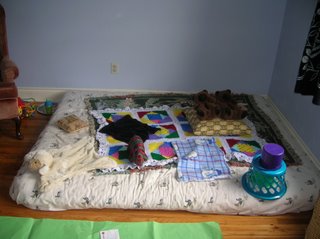
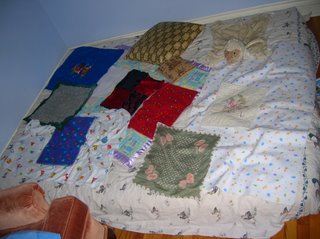
About a month ago I switched from working 4 days a week to 5. Two reasons. Fingers Hilarity started pre-school, and he loves it, and asked to go Every Day; and, my job simultaneously got super busy. So no more Tuesdays with the kid, which we had had together since he was a few months old and my beloved spouse’s maternity leave ended. But this morning my spouse has a meeting and so I went to work at 8 for about 75 minutes, and came back for a couple of hours, and then will go back to work this afternoon. And it’s nice! To be home!
Right now Mr. Hilarity is making his bed, which is a major daily artistic production.
We’ve been compiling pictures of his beds into a slide show, and I just added a song, as is so easy on a computer: Sheryl Crow singing “Mother Nature’s Son.” The movies know this: the combination of music and imagery wallops the emotions. Six and a half years ago friends of ours adopted a girl from China. My beloved spouse and I went with them to be tourists together for a week beforehand. A few years later they sent us a DVD of a slide show of their daughter, including the trip to China and their girl getting bigger, and set it to a sweet medley of “What a Wonderful World” and “Over the Rainbow” sung by Israel Kamakawiwo'ole, and every time I watched it I cried.
Simon has more good stuff on “nostalgia for the future,” and as I have thought about the phrase more, I have grown to mostly reject it as anything more than a teasing contradiction -- not really a paradox, which is a “seeming contradiction,” but a para-paradox, something that seems to be a seeming-contradiction, but is really merely a contradiction.
One can only be nostalgic for experiences of which one has confidence in their actual occurrence. So I can think of three circumstances in which one could be nostalgic for the future.
First, a kid can be nostalgic for growing up. “When I’m bigger I can do that!” This is real. But this is not what future-nostalgists are talking about. And is it even nostalgia? Or is it anticipation? Remembering it now, it feels like impatient anticipation, versus the excited anticipation of, say, dressing for a date.
Second, a dying person can be nostalgic for the future he or she won’t share. I know my dad was experiencing that. When I told I’d miss him like crazy, a few days before he died, he said he’d miss me too, but that’s the way it goes. Even more, he regretted leaving his grandchildren. They were the ones he was happiest to see in his last days. But from what I can glean, I don’t feel that future nostalgists are talking about anything so intimate or personal.
The future-nostalgists seem to be talking about a more social circumstance, less intimate, more utopian -- Moses nostalgic for the Promised Land. But I’m not convinced that Ned Rorem or Brian Eno really felt these things. If they were confident of a brighter future that they would personally experience, then that would be anticipation. Simply imagining a better social circumstance is mere wistfulness, not nostalgia. Confidence in a brighter future combined with confidence in the impossibility of one’s sharing that future is rare, and bound up with mortality.
Walter Benjamin, in his “Theses on the Philosophy of History” explicitly says that almost nobody is nostalgic for the future:
‘One of the most remarkable characteristics of human nature,’ writes Lotze, ‘is, alongside so much selfishness in specific instances, the freedom from envy which the present displays toward the future.’ Reflection shows us that our image of happiness is thoroughly colored by the time to which the course of our own existence has assigned us.
This makes sense to me. Utopian hopes remain utopian hopes, and working toward making them real remains independent of believing that they will actually occur. Hope comes only from the working-toward, and from finding temporary, local instances of the actuality, however limited and ultimately compromised.
The bed is made. Good morning!



